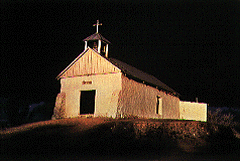
Cornerstones: Rebuilding Traditions |
|
Ranging in age from 50 to 330 years, New Mexico's more than 362 historic adobe churches symbolize the zeal of the Spanish Conquistadores and Franciscan Friars, the tenacity of the frontier settlers and the profound spiritualism of present-day villagers. And yet, the combined factors of shrinking congregations, well-intentioned but misdirected preservation efforts, and a lack of technical skills to initiate repairs and restoration have left many of the churches in imminent danger of loss or severe disrepair. This situation resulted in the Adobe Churches of New Mexico being designated one of "America's 11 Most Endangered Historic Places" by the National Trust for Historic Preservation in 1996. |
More than 300 adobe mission churches are tucked into hillsides and valleys throughout New Mexico. These centers of living tradition have been the focal point for rural villages since they were first settled in the 1700s and 1800s. Thick clay walls have sheltered generations of baptisms, first holy communions, weddings and funerals. The community came together each year to maintain the church with regular mud plastering and other necessary repairs. While descendants of the original families still live in towns like Chacon, Upper Rociada, Guachupangue and San Patricio, economic realities have pushed young people to larger towns where they have greater access to jobs and schools. |
 Image: © Douglas Keats |
With smaller and older village populations, the cyclical patterns of maintaining and replastering the church are no longer part of everyday life. After a generation or two, the customs have fallen away . . . leaving churches in disrepair and communities unable to pick up the pieces. Cornerstones Community Partnerships is a unique preservation organization that works with rural communities throughout New Mexico to assist them in restoring both their historic churches and their important cultural traditions. Cornerstones' emphasis is on the revitalization of community and the preservation of cultural heritage. By bringing the community together to keep its own history from crumbling, the churches are the vehicle for restoring cultural identity and strengthening the social fabric. Cornerstones works with partners such as the Archdiocese of Santa Fe, collaborating on historic preservation efforts that reflect the traditional blending of faith with community well-being. Since 1986, Cornerstones has worked with villages and pueblos to revitalize communities, restore historic buildings, teach traditional building skills, support cultural traditions and develop leaders. Of the 362 catalogued earthen structures, 126 are currently in danger of loss or severe damage. For many others, deterioration is likely to worsen if left unaddressed. |
 Image: © Douglas Keats |
Cornerstones recognized that the issue was not merely one of the deterioration of beautiful and historically important buildings. The problem actually encompasses a larger unraveling of New Mexico's richly interwoven cultural, economic, and architectural fabric. Economic decline has forced many people to leave their native villages. This has left the remaining villagers struggling to keep their communities alive and the symbols of the communities intact. In many communities, the last few generations have been marked by an interruption in the transfer of important traditional building skills. Well-intentioned but misguided "innovations" such as the widespread use of cement plaster, rather than solving the dilemma of regular maintenance, have actually caused many of the structural problems facing the historic adobe churches today. |
|
Cornerstones' unique approach to preservation is both practical and sustainable: combine the restoration of historic buildings with people-centered community development. Passing it on Cornerstones believes that the best long-term solution for church preservation is the further development of skills among community members. Much of the organization's effort focuses on education in preventive maintenance and training in traditional technologies, particularly among the youth. Traditions are kept alive by ensuring that skills are passed to the next generation. Because the younger generation is crucial to preserving the cultural traditions of the community, Cornerstones has developed special programs to teach traditional building skills to young people. Community elders serve as mentors so that the youth gain a greater appreciation of their cultural heritage and values by learning the technical and leadership skills that can lead to future employment. Partnerships, not Patronage Keys to the success of Cornerstones have been their emphasis on partnership not patronage and a capacity to enlist volunteer support. Big city folks get their hands in the mud on community work days, as do college students. People from many walks of life are inspired by the preservation of culture, and major collaborations have been developed with agencies such as the National Park Service, the Youth Conservation Corps, the New Mexico Department of Labor, and the Archdiocese of Santa Fe. Cornerstones reinforces the initiative, cooperation and self-reliance of the community by encouraging community "ownership" of each project. Very simply, Cornerstones helps people help themselves. To learn more or to become part of this community partnership, contact
|
|
Thanks to Toby Lynn Herzlich, a writer and community development specialist living in northern New Mexico. Fresson Photographs by Douglas Keats, A photographer living and working in New Mexico. He is represented by Martha
Keats Gallery Originally appeared in |
Related Pages |
|
|
Collecting Photography of the Southwest |
|
Collector’s Resources |
|
RESOURCE LISTS UPDATED WHEN VIEWED | ARTICLE CONTENT REVISED January 27, 2009 |